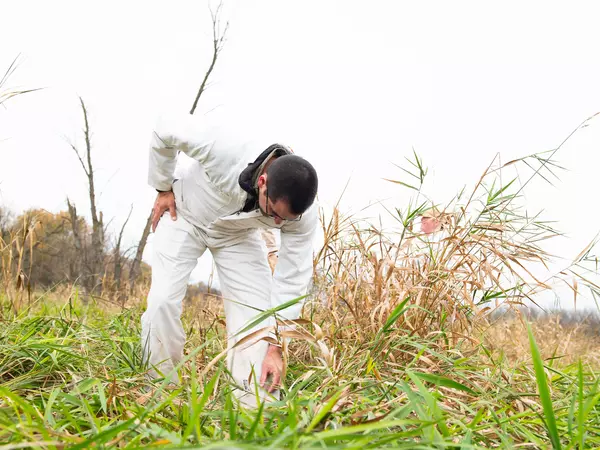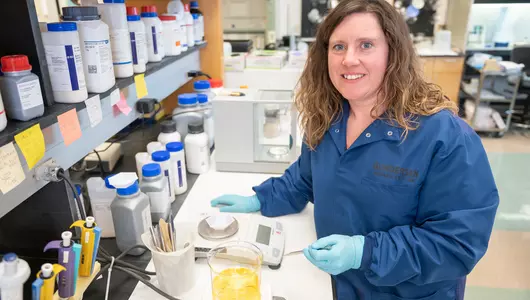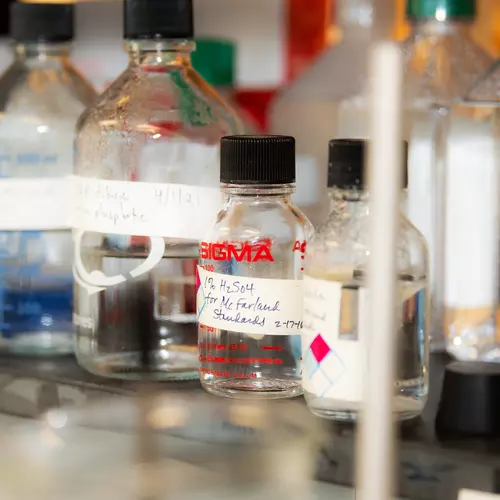
Microbiology Research
Developing the first Lyme disease vaccine for dogs made us a recognized leader in the field. Now we aim to pioneer the next generation vaccine.
Advancing global understanding of Lyme disease
Wisconsin’s natural habitat is a perfect breeding ground for zoonotic diseases since we share spaces with wildlife year-round. To address the prevalence of Lyme disease in our backyard, Gundersen’s Microbiology Research team focuses on vector-borne illnesses.
Our research scientists were among the first to develop and standardize robust methodologies to study Lyme disease when it was unknown or misunderstood. Years later, our researchers helped develop the first Lyme disease vaccine for canines and went on to:
- Conduct STTT vs MTTT diagnostic studies
- Develop and refine borreliacidal antibody testing
- Develop and refine the understanding of the C6/PepC10 diagnostic paradigm
- Carefully evaluate real-world usage of various diagnostic modalities for Borrelia species across several decades to assess their utility
Our research team dedicates itself now to understanding the immunology of the disease in humans so that it can develop a test for detecting it and a vaccine that will protect everyone who enjoys our natural habitats.

Support our Lyme disease research
We can’t continue our ground-breaking work without you. Generous donations provide our state-of-the-art equipment for diagnostics and research and the space to explore cutting-edge methodologies and techniques that are resource intensive. You accelerate our work. You help find answers.
-
500
archived and characterized samples from confirmed Anaplasma, Babesia and Borrelia patients
-
1,500
PCR tests for Anaplasma, Borrelia and Babesia annually
-
1,270
archived and characterized Lyme serology samples
Lyme disease researchers

Arick Sabin, DO
(608) 775-2817

Steven Lovrich, PhD
(608) 775-3743

Brooklynn Scholze
(608) 775-3743

Emilee Francksen
Publications
Detection of Crystals in Gram-Stained Synovial Fluid
Published on: 2025-02-04CONCLUSIONS: Crystal examination of Gram-stained synovial and bursal fluid by trained personnel has low sensitivity but high specificity compared with standard evaluation of unstained samples. Examination of Gram-stained samples with PLM may be helpful when sample volumes are limited and, when positive, has sufficient specificity to support crystalline arthropathy diagnoses.
Read moreClinical evaluation of a Borrelia modified two-tiered testing (MTTT) shows increased early sensitivity for Borrelia burgdorferi but not other endemic Borrelia species in a high incidence region for Lyme disease in Wisconsin
Published on: 2022-11-12A modified two-tiered testing algorithm (MTTT; ZEUS Scientific) for Borrelia burgdorferi was recently FDA-cleared. We evaluated the MTTT algorithm to confirm Lyme disease and compared the findings in parallel with those obtained using standard two-tiered testing (STTT). Medical records from patients who submitted sera for laboratory confirmation of Lyme-like disease were reviewed. Three hundred twenty patient samples were run by the STTT and MTTT approaches and the results compared. Positive...
Read moreOptimized infection control practices augment the robust protective effect of vaccination for ESRD patients during a hemodialysis facility SARS-CoV-2 outbreak
Published on: 2022-07-22CONCLUSIONS: Prompt recognition of an infection cluster and rapid intervention efforts successfully ended the outbreak. Alongside consistent adherence to core infection prevention measures, vaccination was highly effective in reducing disease incidence and morbidity in this vulnerable population.
Read moreEmergence and onward transmission of a SARS-CoV-2 E484K variant among household contacts of a bamlanivimab-treated patient
Published on: 2022-03-01The implementation of monoclonal antibody therapeutics during the COVID-19 pandemic altered the selective pressures encountered by SARS-CoV-2, raising the possibility of selection for resistant variants. Within-host viral evolution was reported in treated immunocompromised individuals but whether this signifies a real risk of onward transmission is unclear. We used a regional SARS-CoV-2 sequencing program to monitor lineages with clinically relevant variants in identified patients, which...
Read moreOutbreak or pseudo-outbreak? Integrating SARS-CoV-2 sequencing to validate infection control practices in a dialysis facility
Published on: 2021-08-10CONCLUSIONS: With high community prevalence, epidemiological data alone is insufficient to deem a case cluster an outbreak. Cluster evaluation with genomic data, when available with a short turn-around time, can play an important role in infection prevention and control response programs.
Read more
Lyme disease research milestones
Microbiology Research funding provided by donors like you and Gundersen Medical Foundation allowed our team to:
- Develop the Borreliacidal Assay, a test method that serves as the foundation of Lyme research and development
- Improve diagnostic capabilities for zoonotic disease in our region
- Develop a patented and licensed Lyme disease vaccine for dogs
- Collaborate with novel diagnostic technologies, include T2, ChromaCode and more
- Continue development of next-generation Lyme disease diagnostic testing in the era of Modified Two-Tier Testing (MTTT)

More from Gundersen Research Institute

News
Stay current on our research initiatives, achievements and more.

Researchers
Get to know our research leaders and scientists, find out how to contact them and take a look at their work.
We’re here to answer your questions.